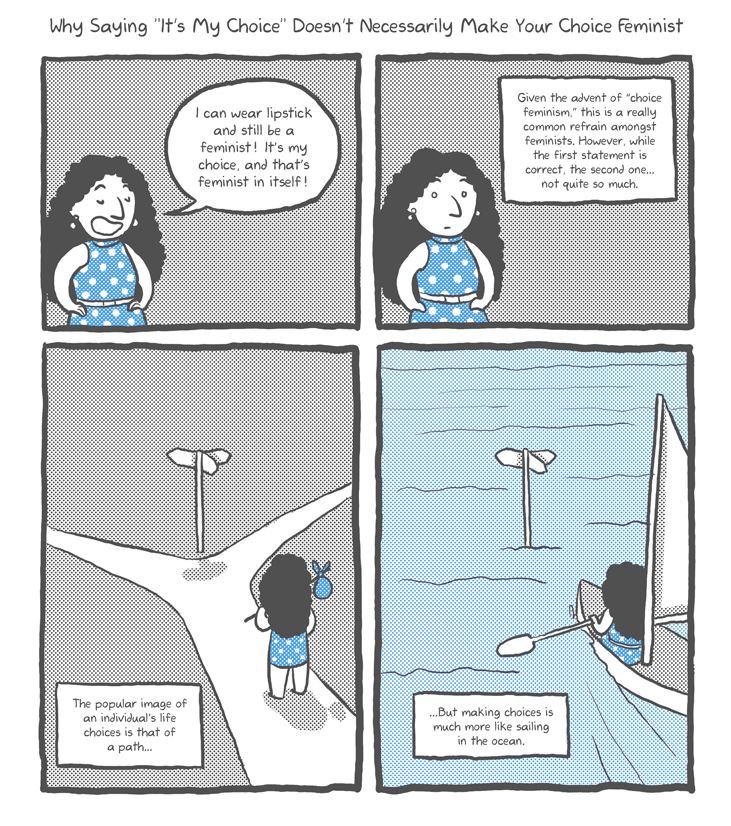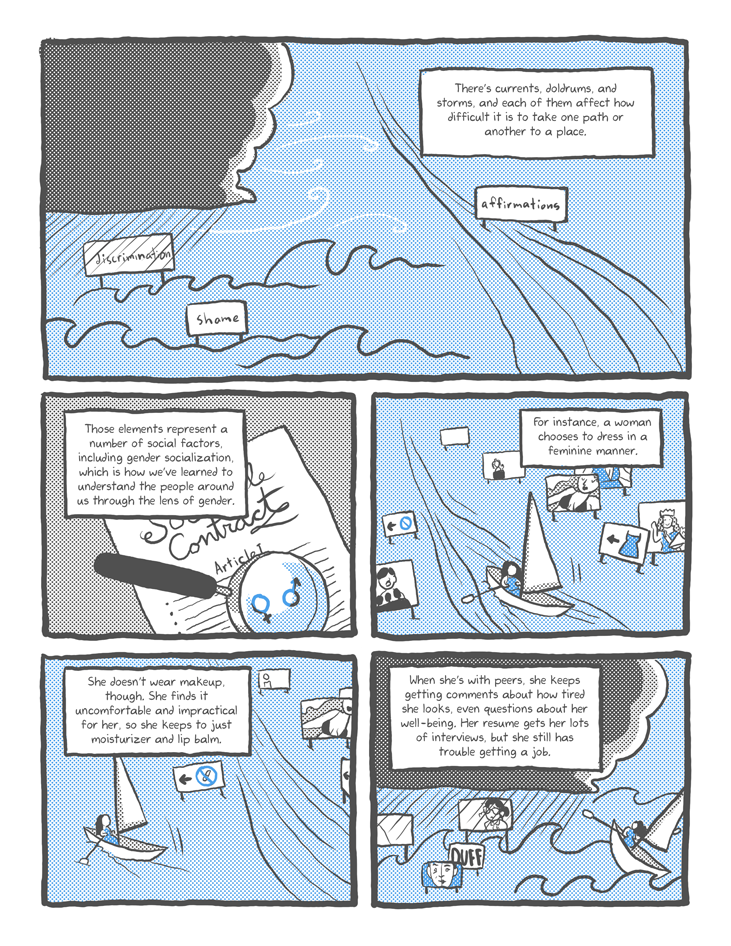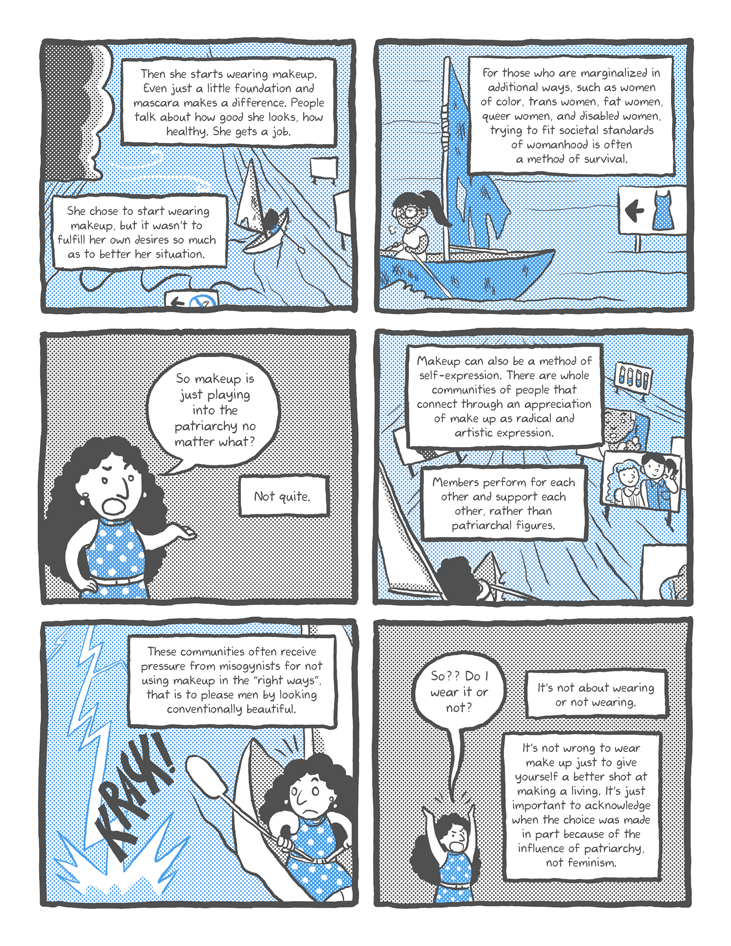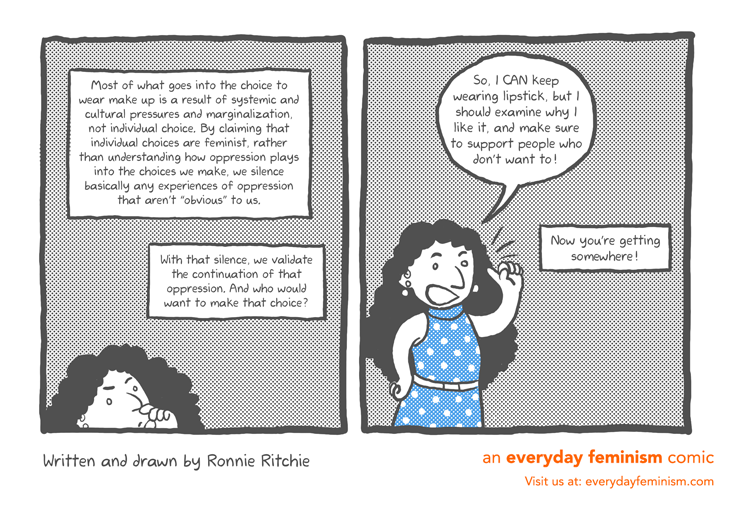white women, feminism, and the illusion of choice
I was raised in the Bible Belt in the 1990s on a steady diet of James Dobson, the moral majority, and "I Kissed Dating Goodbye." My highest calling was to get married, preferably young, have babies and raise them to love Jesus (and America, too). I was immersed in the more "relevant" part of the evangelical church, so women could wear pants and go to college, but our aim as a gender was very different. I was not the main character, I was in search of a man to be the main character so I could take my role as supporting actor.
This actually all sounded great to me at the time, the families around me seemed happy and thriving, men were encouraged to be "strong leaders" and women were encouraged to have "quiet and gentle spirits" (this part of it was predictably challenging for me). Going to college was important because I was a millennial in a relatively privileged family, but the main focus was to meet a husband.
In college, I studied psychology and sociology and learned about feminist theory for the first time. I had previously fallen into the camp that feminism was unnecessary, women had plenty of rights now, and that traditional gender roles would make most people happiest. But the more I learned about the ways women had been oppressed throughout history, the ways our bodies had been depicted in media and advertising, how we subtly accuse women of being complicit in sexual violence done to them, the sheer amount of sexual violence that exists, and the more I examined my life and upbringing, my worldview began to slowly unravel.
My understanding of systems of oppression and feminism being intersectional was extremely rudimentary. I had just discovered that women could work outside the home or not get married and have children and that choice was valid. They weren't worse people than me or making bad choices for their lives, they were just women who made different choices. This concept alone was groundbreaking to me. Gender roles were stupid and assigned arbitrarily, men and women weren't all that different, women can do anything men can do and vice versa! I was a choice feminist, even though I didn't know that term yet. I supported women's rights and wrongs, and if women wanted to live their lives in service to the patriarchy, feminism gave them the choice to do that without judgement or criticism.
So, what is choice feminism? At its core, it's a form of feminism that prioritizes individual freedom and choice and validates any choice that a woman makes of her own free will. But it assumes that we are able to make those choices outside of the influence of patriarchy, which is virtually impossible. It's the air we breathe and the water we swim in. Similar to "there is no ethical consumption under capitalism" there is only an illusion of choice under patriarchy, and that illusion is truly only afforded to women at the top. It allows women with privilege (cis, white, thin, wealthy) to participate in patriarchal norms that have historically harmed women without any accountability, because they are women and any life they choose is the feminist one.
For example, a common double-bind that white women who become mothers find themselves in, “Should I go back to work or should I stay home with my children?” Stay at home mothers put themselves in financially vulnerable positions and can be exploited, working mothers face penalties in the workforce and judgment about their commitment to their children and their work. But women of color are never given this choice or asked this question. Women of color have always worked, and a good portion of that work has been the care of white children and underpaid domestic labor. The “choice” of how to best express your womanhood is a choice that is really only afforded to white women. We don’t seem to particularly care as a society if Black mothers or Hispanic mothers are able to be home with their children, or if they want to enter the workforce because it’s “empowering.” This doesn’t invalidate the difficulties that white mothers face in the workforce or the imbalances of mental load and domestic labor in the home, but intersectionality requires that we acknowledge that we are insulated from struggles that women of color face. Another example is Sabrina Carpenter’s new album cover, we can’t decide if she’s being inappropriate, catering to the male gaze, or if it’s empowering…but Black female artists don’t get those options. White women can be sexual and call it empowering, Black women cannot. That is privilege. And of course, all the while, men can just exist, and we would find it ridiculous to hear a man talk about his sexuality being “empowering.” Even though it’s not fair that women’s choices are so scrutinized, having the choices at all is still a privilege.
Also, none of us are an island. My choices affect others and their choices affect me. All choices are not created equal. Women face social consequences for their choices that men do not. No one asks men who are getting married if they plan on changing their last name, nor would they assume they were bad spouses if they didn't. Taking your husband’s last name in our current structure is not an inherently feminist choice just because a woman decides it’s right for her. And also, taking your husband's name, particularly when you have children, can make it easier to move through the world. Both can be true. Being a married woman gives you status, social and financial. And marriage is an inherently patriarchal structure that has benefited men at the expense of women. Getting married or not are not two options that are viewed the same or have the same consequences. Marriage is patriarchal and bad for women in a broad sense, even if your individual marriage is good. Indulging in beauty standards or not are not two equally valid options, you are treated differently depending on which you choose. Mass use of Botox will change the standards for how women are expected to appear at a certain age. Widespread plastic surgery after giving birth will alter how we expect the post partum body to appear. In general, our social traditions and pressures are as a whole more dangerous for women than they are for men. None of these statements are even meant as judgements, but neutral facts.
”So just because the patriarchy likes it, I can’t do it?” - no, not exactly.
White women can get defensive when this is brought to their attention. I was defensive about this. We will say that we can't be perpetuating the patriarchy because we are part of the oppressed class! We want to enjoy our liberation! And yes, we do experience marginalization because of our gender, but when it comes to our oppression, we are at the top of the food chain. Especially if we are cis, straight, thin, nondisabled. The point is that our choices have consequences, and we are insulated from many of them because of our position. Choice feminism is a very comfortable place to be for us, we can align with exactly how the world expects women to be and slap a feminist label on it without critically examining it or thinking about how our collective societal attitudes would perceive this if we weren’t in our position of privilege. And then we can tell others that we are immune from judgement because it was our choice. It’s hyper individualist, convenient, and lazy.
Folks seem to get really frustrated with this because they don’t understand what they are supposed to do about all of this. They will ask if their individual choice of getting married, being a stay at home mom, or expressing their sexuality in a way that caters to the male gaze is specifically holding up the patriarchy. This is like asking if you shopping at Amazon is specifically holding up capitalism. This is much bigger and more complex than any individual woman making decisions that are right for her, and collectively, those decisions do have an impact. Nobody is asking you to not marry a man you love or to stop shaving your legs, but they are asking you to sit in the discomfort of acknowledging that when we do these things, we are perpetuating patriarchal ideals. Making you feel like a “bad feminist” is not the point. Understanding that feminism is not an individual pursuit, but a social movement intended to liberate all women, not just elite women, is the point. The point is an awareness that when you hold the most privilege in a marginalized group, you do having to contend with your own privilege even if you experience oppression because of an immutable characteristic.
Most folks have not read feminist theory and their understanding of feminism comes from the mainstream and pop culture. Which is totally fine and pretty normal. But if you are entering this conversation blind as a straight white woman, your aim should be to listen to women who hold less privilege than you, be curious and thoughtful, and to educate yourself1 on these topics instead of centering yourself and your personal, individual experience. That is arrogance. Not a single one of us has “arrived.” I did not realize I was a choice feminist until it was pointed out to me, and it took me an embarrassingly long time to understand and for it to sink in. It probably has not fully sunk in.
Critiquing choice feminism is not pointing fingers at women who take on traditional roles. It is critiquing a movement that does not take into account that our decisions have ramifications beyond us. It’s acknowledgement that having options is a privilege, and a privilege that we should be looking to afford to more women. It’s understanding that our agency can be limited and our choices being framed as “equal” is an intentional deception.
Choice feminism is an almost unavoidable step in the journey if you come from a world where you were given one specific script for how to be a woman, regardless of what that script was.
But it’s really only the first layer. And we will do a disservice to everyone if we stop there.
Women, Race, and Class by Angela Davis is a good place to start






Your writing, once again, is strong, coherent and makes your case. Thank you for this, Emily.
This just came across my feed, but I’m so glad I found it. I got into an argument with a fairly well known feminist writer who asserted that you could be a feminist and still get Botox because women should have “free choice,” and she attacked me for disagreeing with her. And I’m like, but how do you not see that that’s contributing to unhealthy beauty standards and literally encouraging women to waste their own money on upholding toxic beauty culture…left that convo feeling so gaslit